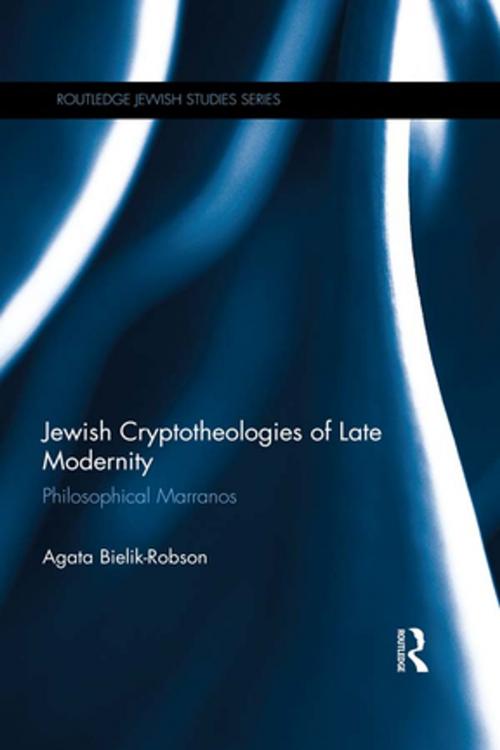Jewish Cryptotheologies of Late Modernity
Philosophical Marranos
Nonfiction, Religion & Spirituality, Philosophy, Social & Cultural Studies, Social Science| Author: | Agata Bielik-Robson | ISBN: | 9781317684497 |
| Publisher: | Taylor and Francis | Publication: | August 13, 2014 |
| Imprint: | Routledge | Language: | English |
| Author: | Agata Bielik-Robson |
| ISBN: | 9781317684497 |
| Publisher: | Taylor and Francis |
| Publication: | August 13, 2014 |
| Imprint: | Routledge |
| Language: | English |
This book aims to interpret ‘Jewish Philosophy’ in terms of the Marrano phenomenon: as a conscious clinamen of philosophical forms used in order to convey a ‘secret message’ which cannot find an open articulation.
The Marrano phenomenon is employed here, in the domain of modern philosophical thought, where an analogous tendency can be seen: the clash of an open idiom and a secret meaning, which transforms both the medium and the message. Focussing on key figures of late modern, twentieth century Jewish thought; Hermann Cohen, Gershom Scholem, Walter Benjamin, Franz Rosenzweig, Theodor Adorno, Ernst Bloch, Jacob Taubes, Emmanuel Levinas and Jacques Derrida, this book demonstrates how their respective manners of conceptualization swerve from the philosophical mainstream along the Marrano ‘secret curve.’
Analysing their unique contribution to the ‘unfinished project of modernity,’ including issues of the future of the Enlightenment, modern nihilism and post-secular negotiation with religious heritage, this book will be essential reading for students and researchers with an interest in Jewish Studies and Philosophy.
This book aims to interpret ‘Jewish Philosophy’ in terms of the Marrano phenomenon: as a conscious clinamen of philosophical forms used in order to convey a ‘secret message’ which cannot find an open articulation.
The Marrano phenomenon is employed here, in the domain of modern philosophical thought, where an analogous tendency can be seen: the clash of an open idiom and a secret meaning, which transforms both the medium and the message. Focussing on key figures of late modern, twentieth century Jewish thought; Hermann Cohen, Gershom Scholem, Walter Benjamin, Franz Rosenzweig, Theodor Adorno, Ernst Bloch, Jacob Taubes, Emmanuel Levinas and Jacques Derrida, this book demonstrates how their respective manners of conceptualization swerve from the philosophical mainstream along the Marrano ‘secret curve.’
Analysing their unique contribution to the ‘unfinished project of modernity,’ including issues of the future of the Enlightenment, modern nihilism and post-secular negotiation with religious heritage, this book will be essential reading for students and researchers with an interest in Jewish Studies and Philosophy.















